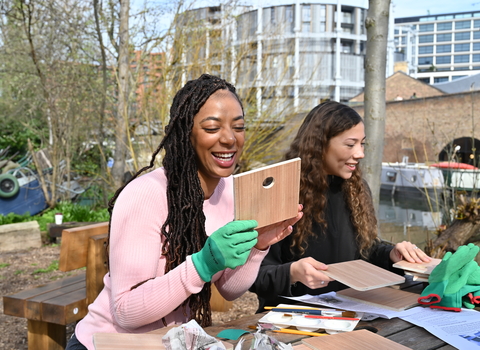Community Action for Nature webinars
Learn from established community groups and industry experts about simple actions to support wildlife and people to flourish across Surrey. Let’s give nature a chance to fight back and make all our lives safer, healthier, and more enjoyable!
These webinars are part of the Wilder Communities programme that seeks to highlight how local people are working together to bring nature into everyone’s daily life, wherever they live and whatever their backgrounds, beliefs, or interests.
Webinar 1: How can communities help?
| Wondering about the state of nature and how communities can help? Nature is struggling globally, but community action can have a significant impact on the local environment and improve the critical state of nature. |
|
In this webinar, discover why community action is so important for the future of Surrey’s wildlife.
|
Webinar 2: How to increase habitat biodiversity
|
Wondering how you can protect and help wildlife in Surrey? Discover inspiring solutions to help increase the diversity and number of animal and plant life within community spaces. |
|
Join our expert speakers to find out:
|
Webinar 3: Choosing an environmental intervention
| Discover insights into exciting projects you could start in your local area and learn more about different environmental interventions. |
|
Join our expert speakers to find out:
|
Webinar 4: Understanding Surrey’s landscape
| Wondering how communities in different locations can help connect landscapes across Surrey? In our fourth and final webinar, we will discuss the vital role that communities can play in improving and linking up green spaces for wildlife to recover. |
|
Join our expert speakers to find out about:
|
Nature-Based Solutions talk
Nature-Based Solutions (NBS) involve working with nature in order to protect and restore ecosystems, while also addressing challenges such as climate change or flood-risk management. Watch the below Q&A session to explore Nature-Based Solutions in your community. Find out more about Nature-Based Solutions.
Nature-Based Solutions Q&A session
| Do you want to improve your community space for nature but need some guidance? This session includes a brief introduction to different Nature-Based Solutions for community spaces, led by Ben Habgood. After a short presentation, Ben answers questions on this topic. |
Ben Habgood,Nature-Based Solutions ManagerBen is part of the Nature-Based Solutions and Project team, engaging and working with local land owners and managers to help them better manage their land for nature, biodiversity and landscape-scale connectivity. Ben’s environmental aspiration is that he wants to help make Surrey a more diverse, naturally richer, better connected and more resilient landscape in the face of the biodiversity and climate crisis we all now face. |
Guildford Goes Wild talk recordings
A series of talks from engaging and knowledgeable speakers took place at SWT community event Guildford Goes Wild on Saturday 15th July 2023. Watch the below talk recordings to learn about the power of our communities, how to speak up for wildlife and how to take action for insects at home.
Talk 1: Action for Insects
|
The talk 'Action for Insects' focuses on how to encourage wildlife and especially insects into our outdoor spaces, their important uses as ecosystem service providers, and what species we might expect to find in a thriving habitat. |
Talay Namintraporn,Wildlife and Beetle SpecialistTalay's passion for the natural world began as a young child growing up in Thailand where she was surrounded by fascinating invertebrates. Talay spent many years volunteering at the Natural History Museum in the Coleoptera department and went on to complete a MSc in Zoology at The University of Bristol, focusing on encouraging beneficial insects in our changing climate. Talay now works in environmental education as a Learning Facilitator at the Natural History Museum, The Royal Parks and Earth Trust. |
Talk 2: Find Your Voice
| The talk 'Find Your Voice' explores how we as individuals can create change through campaigning and activism. |
Owen Gibbons,Campaigner and StrategistOwen Gibbons has spent much of his career as a campaigner, policy adviser and advocate for change - from his first role as a campaigner at Amnesty International through more than ten years as a campaigner and advisor at the UK and international offices of the environmental organisation, WWF, to his current role as Regional Director for Campaigning and Advocacy at Compassion in World Farming. He has also spent 5 years working in the center of government at the UK's Cabinet Office. |
Talk 3: Powerful Communities
| The talk 'Powerful Communities' explores how strength in communities to bring people together can create opportunities for people to build skills, friendships and community cohesion, helping us to benefit from nature. |
Bryony Carter,Community Organising Manager for The Wildlife TrustsBryony has over 15 years of experience working with communities to understand, listen and help bring about change by building confidence and power in communities. Bryony talks about how The Wildlife Trusts are changing the way they connect with people through the Nextdoor Nature project with some case studies of what is being achieved. |

